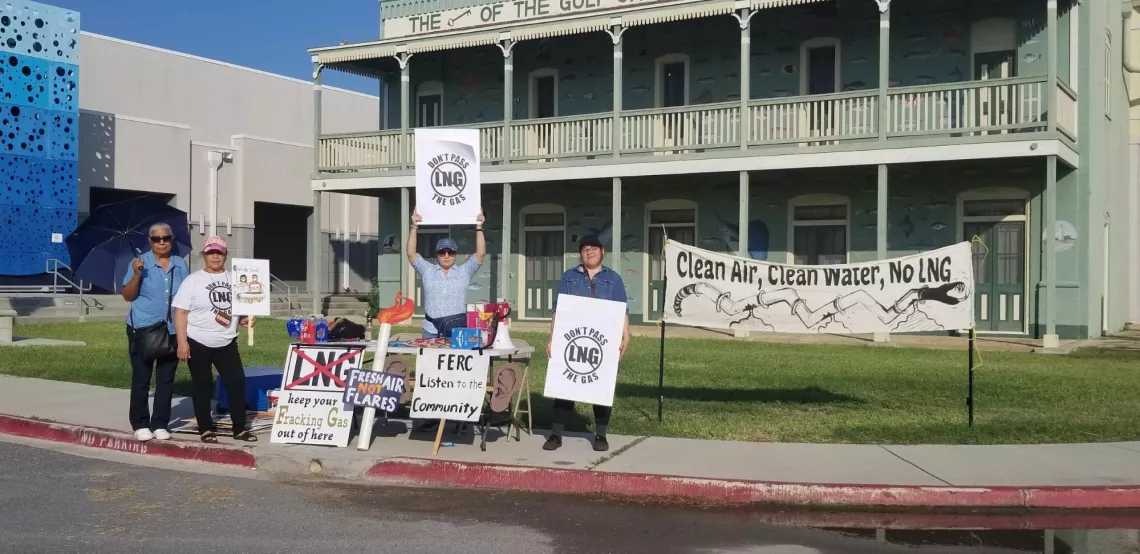Courtney Naquin, courtney.naquin@sierraclub.org
Emma Guevara, emma.guevara@sierraclub.org

Photo courtesy of Dina Nuñez
Port Isabel, Texas - At a public meeting yesterday, community members and organizations: Sierra Club, Carrizo Comecrudo Tribe of Texas, Border Workers United, South Texas Environmental Justice Network, and Texas Rising from the Rio Grande Valley told the Federal Energy Regulatory Commission (FERC) to reject the not-yet-built Rio Grande liquefied natural gas (LNG) project and the proposal to expand the facility to include a pipeline and carbon capture storage (CCS) in Cameron County. With or without CCS, Rio Grande LNG would be a massive gas plant spewing the largest amounts of greenhouse gas emissions and toxic pollution in the Rio Grande Valley.
The Rio Grande Valley community opposes the LNG and the carbon capture storage facility for Rio Grande LNG. Last year, public pressure stopped the Cameron County commissioners from sending a letter supporting the CCS proposal to the Department of Energy. Carbon capture technology has yet to be applied to any gas export facilities in the U.S and has been unsuccessful for other fossil fuel projects. Rio Grande LNG has partnered with the Mitsubishi company for its clean carbon storage facility. But Mitsubishi failed at a previous attempt to capture carbon for coal plants because of cost and technology problems. CCS remains an untested and unproven technology for LNG.
If built, Rio Grande LNG and the other proposed facility Texas LNG would construct massive gas plants on some of the last remaining stretch of pristine coastline in Texas without the fossil fuel industry. LNG facilities’ processes would include fiery flare stacks and ground flares and include storage tanks about 15 stories tall next door to Port Isabel area communities and the Laguna Atascosa Wildlife Refuge. The Rio Grande LNG and Texas LNG projects also require the development of massive pipelines carrying flammable gas that could force an evacuation in the event of a leak, explosion or other catastrophe. LNG tanker ships approximately three football fields long carrying hazardous cargo would congest the ship channel that is essential for shrimpers, fishing guides and dolphin watch tours, and could kill sea turtles among other marine life.
Opponents of Rio Grande LNG also criticized the FERC's public meeting format because it did not allow residents to hear others' oral comments or receive more information about the project. The public has until October 3 at 5 PM EST to submit an online comment about the carbon capture storage proposal to the FERC.
“The FERC’s meeting yesterday was a complete sham. Rio Grande LNG and the CCS project will be incredibly dangerous to our community, but FERC did not seem to have our community’s best interest in mind. FERC didn’t give us information about the LNG CCS project or allow the public to hear comments from other community members at the meeting,” said Emma Guevara, Brownsville Sierra Club organizer. “Yesterday, the community showed up to oppose Rio Grande LNG and their plans to include a carbon capture facility because we don’t want a dangerous, polluting gas facility and even more fossil fuel industry operations.
“We met with the Federal Energy Regulatory Commission (FERC)’s staff to demand that they consult with the Carrizo Comecrudo Tribe of Texas because we are the original people of this region, and the Rio Grande LNG construction and operations would destroy our sacred sites,” said Dr. Christopher Basaldú, member of the Carrizo Comecrudo Tribe of Texas. “FERC needs to listen to us: we oppose Rio Grande LNG and their plans to expand their gas plant to include ineffective and destructive carbon capture on our lands.
“If LNG comes to our community, it would completely change our way of life for the worse,” said Lupita Sanchez with Border Workers United. “Our lives depend on clean waters so people can fish for their families, and we need clean air because our family members already have asthma and other health problems. The community needs a better local economy, but we do not need to sacrifice our health. We came out here to protest FERC and demand that they cancel Rio Grande LNG’s plans.”
“All LNG projects are dangerous to the environment and the communities near them, and Rio Grande LNG will be no different. The inclusion of a carbon capture sequestration in their project plans is just a feeble attempt to greenwash fracking. The FERC needs to take the community’s concerns into consideration and protect us accordingly,” said Denisce Palacios from Texas Rising Action.
About the Sierra Club
The Sierra Club is America’s largest and most influential grassroots environmental organization, with millions of members and supporters. In addition to protecting every person's right to get outdoors and access the healing power of nature, the Sierra Club works to promote clean energy, safeguard the health of our communities, protect wildlife, and preserve our remaining wild places through grassroots activism, public education, lobbying, and legal action. For more information, visit www.sierraclub.org.